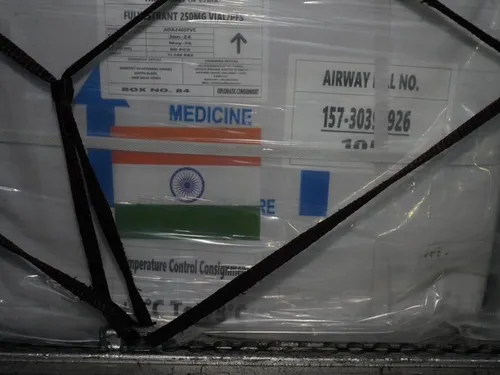
Introduction
In a significant humanitarian gesture, India has recently dispatched a consignment of anti-cancer drugs to Syria. This act of international solidarity underscores India’s commitment to global health and humanitarian aid. The move comes at a time when Syria faces severe challenges, including ongoing conflict and a strained healthcare system. This essay explores the importance of this assistance, the context of Syria’s healthcare crisis, and the broader implications for international relations and humanitarian efforts.
Table of Contents
The Humanitarian Gesture
India’s decision to send anti-cancer drugs to Syria represents a critical intervention in a region severely impacted by conflict. Cancer treatment is often costly and complex, requiring access to specialized medications and medical care. In regions affected by war, such as Syria, these essential resources are frequently scarce or entirely unavailable. By providing these drugs, India not only addresses an immediate medical need but also sends a powerful message of solidarity and compassion.
Context of Syria’s Healthcare Crisis
Syria has been embroiled in a protracted conflict that began in 2011, leading to a devastating humanitarian crisis. The war has destroyed much of the country’s infrastructure, including hospitals and medical facilities. The healthcare system is struggling to cope with the demands of war casualties and chronic health issues. This situation has significantly impacted the availability and distribution of essential medications, including those needed for cancer treatment.
The Syrian population faces tremendous difficulties in accessing basic healthcare services. The war has led to severe shortages of medical supplies and staff, making it nearly impossible for many Syrians to receive adequate treatment for serious conditions like cancer. In this dire context, the arrival of anti-cancer drugs from India is a beacon of hope for patients who otherwise might not have had access to life-saving treatments.
The Role of International Aid
India’s assistance to Syria is part of a broader international trend where countries extend support to one another during times of crisis. Humanitarian aid plays a crucial role in addressing immediate needs and mitigating suffering in conflict zones. It is an expression of global solidarity and cooperation, reflecting a shared commitment to human dignity and welfare.
This act of sending anti-cancer drugs not only provides direct medical benefits but also enhances India’s standing in the international community. It demonstrates India’s willingness to contribute positively to global humanitarian efforts, reinforcing its role as a responsible member of the global community. Such actions are essential in fostering international goodwill and building strong diplomatic relations.
Implications for International Relations
The dispatch of anti-cancer drugs to Syria also has significant implications for international relations. By providing aid to a country in need, India strengthens its diplomatic ties and enhances its reputation as a benevolent global player. This gesture can lead to increased cooperation and positive interactions with other nations, including those in the Middle East and beyond.
Moreover, humanitarian assistance can serve as a platform for broader diplomatic engagement. It opens channels for dialogue and collaboration on various fronts, including economic, cultural, and political exchanges. India’s support for Syria underscores its commitment to addressing global challenges and contributing to international peace and stability.
Challenges and Considerations
While the dispatch of anti-cancer drugs is a commendable effort, it is important to acknowledge the challenges associated with delivering humanitarian aid in conflict zones. Ensuring that aid reaches its intended recipients requires careful planning and coordination. There are often logistical hurdles, security concerns, and bureaucratic obstacles that can impact the effectiveness of humanitarian efforts.
In the case of Syria, the complex security situation and the presence of various factions complicate the delivery and distribution of aid. Ensuring that the drugs reach the patients who need them most requires collaboration with international organizations and local partners. Despite these challenges, the commitment to providing aid reflects a deep understanding of the importance of addressing urgent humanitarian needs.
The Broader Impact
The impact of India’s humanitarian assistance extends beyond the immediate provision of drugs. It represents a commitment to the principles of human rights and dignity. By prioritizing the health and well-being of individuals affected by conflict, India helps to address some of the most pressing needs of the Syrian population.
Furthermore, such acts of assistance contribute to a culture of empathy and mutual support among nations. They reinforce the idea that, despite geopolitical differences, countries can come together to address common challenges and support one another in times of crisis. This collective effort is crucial for fostering a more compassionate and interconnected world.
Conclusion
India’s dispatch of anti-cancer drugs to Syria is a noteworthy example of humanitarian assistance that highlights the importance of international solidarity in addressing global health crises. By providing essential medications to a country facing severe challenges, India demonstrates its commitment to global welfare and reinforces its role as a responsible global actor.
The context of Syria’s healthcare crisis underscores the significance of this aid, offering hope and relief to patients in dire need. As the world continues to grapple with complex humanitarian challenges, such acts of compassion and support are vital for building a more just and equitable global community. India’s gesture not only addresses immediate medical needs but also fosters positive international relations and contributes to a culture of mutual assistance and understanding.







